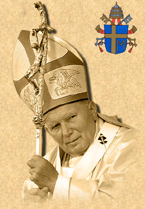The importance of music in biblical religion is shown very simply by the fact that the verb “to sing” (with related words such as “song”, and. so forth) is one of the most commonly used words in the Bible. It occurs 309 times in the Old Testament and thirty-six in the New. When man comes into contact with God, mere speech is not enough. Areas of his existence are awakened that spontaneously turn into song. Indeed, man’s own being is insufficient for what he has to express, and so he invites the whole of creation to become a song with him: “Awake, my soul! Awake, 0 harp and lyre! I will awake the dawn! I will give thanks to you, 0 Lord, among the peoples; I will sing praises to you among the nations. For your steadfast love is great to the heavens, your faithfulness to the clouds” (Ps 57:8f.). We find the first mention of singing in the Bible after the crossing of the Red Sea. Israel has now been definitively delivered from slavery. In a desperate situation, it has had an overwhelming experience of God’s saving power. Just as Moses as a baby was taken from the Nile and only then really received the gift of life, so Israel now feels as if it has been, so to speak, taken out of the water: it is free, newly endowed with the gift of itself from God’s own hands. In the biblical account, the people’s reaction to the foundational event of salvation is described in this sentence: “[T]hey believed in the Lord and in his servant Moses” (Ex 14:31). But then follows a second reaction, which soars up from the first with elemental force: "Then Moses and the people of Israel sang this song to the Lord” (i 5: i). Year by year, at the Easter Vigil, Christians join in the singing of this song. They sing it in a new way as their song, because they know that they have been “taken out of the water” by God’s power, set free by God for authentic life. Commentary: It is apparent from the above description that the biblical understanding of "singing a new song" is not literalistically defined as the continuous writing of newly produced songs for the industry of gospel music as many think it is today. Singing a new song is about singing a song that has been sung for decades and centuries, repeatedly, but tirelessly. Every time we sing those songs of our ancient past, it is as if a new freshness enters it as we are confronted by its essence anew, again and again, and experience the ever-unchanging truth again and again in our lives as the worshipping community. At Easter, we sing a song of Moses that spans thousands of years, but the song is sung anew again and again, and the Church trumpets that song tirelessly. Every year, this song is sung all over again as if it had never been sung before, because the story of our salvation and deliverance is told in our midst once again in music and song. Newness in the music of our worship is not about novelness as many people have come to misunderstand. The precise mystery of the worship of God's people is not in that they keep writing new songs which give them a status as the "state-of-the-art" community of songwriters. The mystery of the worshipping community lies in the very fact that it is a continuation of a century-old story, and that it never gets bored or feel ashamed of telling forth that story continuously - because the song reminds the community where it has come from and assures it of where it is going.
0 Comments
Leave a Reply. |
Categories
All
Archives
December 2021
|
|
FOLLOW DEACON SHERMAN DEACON'S FORMATION FB GROUP
© 2021 Sherman Kuek. All rights reserved.
|

 RSS Feed
RSS Feed












